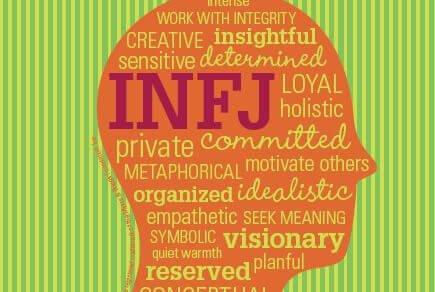The INFJ Personality, the Most Rare Personality (According to Carl Jung)


Written and verified by the psychologist Valeria Sabater
The INFJ personality, a unique combination of the psychological traits of introversion, intuition, feeling and judgment, represents — according to Carl Jung — only 1% of the population.
This personality is idealistic, serene, firm in its values, highly sensitive, but sure of itself and always oriented towards improving the lives of others.
If you haven’t heard about this personality type, it won’t take you long to find a book. There are all kinds of articles that the list 10 key characteristics of this personality.
INFJs are somewhat fashionable in America and Europe. While at first glance it may make you think of a highly sensitive personality, they’re not exactly the same.
To understand the INFJ a little better, let’s take a trip to its origin. The INFJ classification is part of the Myers-Briggs Type Indicator, a personality test designed to identify our personal preferences. This test is based on the psychological types developed by Carl Jung, defined throughout his clinical experience.
Today, this indicator is used mainly for group dynamics and personal growth tests. However, we should say that more academic settings and rigorous psychological literature don’t give it much validity.
But Carl Jung’s work on psychological types is always interesting. It’s become quite popular, his contribution to the study of personality especially.
So out of all the Myers-Briggs personalities, INFJ stands out for being the most rare and unique. Let’s dig a little deeper…

The INFJ personality, or the “lawyer”
The Myers-Briggs is a kind of psychological test that education professionals usually like. It makes it easier for students to get to know each other and to make more informed decisions about their academic and work future.
Through its four scales, we can know, for example, how we see the world, how we process our surroundings, or how we relate to each other.
It’s based on 8 types of extroverted personalities and 8 introverted personalities, with the INFJ personality being the most unusual of them all. Here are the characteristics.
Oriented towards helping others
The INFJ personality is a “lawyer type” for the following reasons:
- They are idealistic and have a high sense of what is right and what is wrong.
- They are guided by their values and beliefs.
- One of their clearest objectives is to help others.
- However, they are not limited to “rescuing” others, because the INFJ personality can inspire, help others improve, progress, and become people who don’t need to be rescued.
They are good at relating to others but they value being by themselves
This type of personality profile has a special ability to build relationships. They know how to make friends and keep them, they are warm and friendly, simple and good conversationalists.
Viewed from the outside they may give the impression that they’re an extrovert. However, INFJs control their time spent being social very well and limit it for one very basic reason.
They are introverted by nature and need time alone to recharge their energy.

They are active dreamers
INFJ’s are tireless dreamers. However, their dreams aren’t merely wishful thinking, like passive dreamers with idealism so fragile and light that the wind can blow it away. Quite the opposite.
This personality has a natural need to contribute to society, and from there, to dream while awake to act with conviction and determination.
At work, these people always show independence, goal orientation, high creativity, and a lot of intuition. Also, they often like both art and science.
Their enthusiasm and idealism can exhaust them
INFJs have only one problem: society. In a world full of inequalities, closed doors, and walls to overcome daily, it’s easy to get discouraged. Hence, it’s common for an INFJ to end up disappointed and physically and emotionally worn down.
It’s not easy for them to face daily criticism, stress, and clashes between their idealism and harsh reality. Also, another fact that characterizes them is that they often forget to take care of themselves.
“Every man must decide whether he will walk in the light of creative altruism or in the darkness of destructive selfishness”.
-Martin Luther King-

Given the main characteristics of this type of personality, Carl Gustav Jung defines, we can see that INFJs are those whose thoughts echo in the world and create revolutions.
That 1% of the population is the light of our society. People with clear ideals, dreamers with a purpose who want to give their best to others.
If you think you’re an INFJ, we will give just one piece of advice: persist without neglecting your ideals. We should never give up, because sometimes, that 1% of the population is enough to inspire the other 99%.
The INFJ personality, a unique combination of the psychological traits of introversion, intuition, feeling and judgment, represents — according to Carl Jung — only 1% of the population.
This personality is idealistic, serene, firm in its values, highly sensitive, but sure of itself and always oriented towards improving the lives of others.
If you haven’t heard about this personality type, it won’t take you long to find a book. There are all kinds of articles that the list 10 key characteristics of this personality.
INFJs are somewhat fashionable in America and Europe. While at first glance it may make you think of a highly sensitive personality, they’re not exactly the same.
To understand the INFJ a little better, let’s take a trip to its origin. The INFJ classification is part of the Myers-Briggs Type Indicator, a personality test designed to identify our personal preferences. This test is based on the psychological types developed by Carl Jung, defined throughout his clinical experience.
Today, this indicator is used mainly for group dynamics and personal growth tests. However, we should say that more academic settings and rigorous psychological literature don’t give it much validity.
But Carl Jung’s work on psychological types is always interesting. It’s become quite popular, his contribution to the study of personality especially.
So out of all the Myers-Briggs personalities, INFJ stands out for being the most rare and unique. Let’s dig a little deeper…

The INFJ personality, or the “lawyer”
The Myers-Briggs is a kind of psychological test that education professionals usually like. It makes it easier for students to get to know each other and to make more informed decisions about their academic and work future.
Through its four scales, we can know, for example, how we see the world, how we process our surroundings, or how we relate to each other.
It’s based on 8 types of extroverted personalities and 8 introverted personalities, with the INFJ personality being the most unusual of them all. Here are the characteristics.
Oriented towards helping others
The INFJ personality is a “lawyer type” for the following reasons:
- They are idealistic and have a high sense of what is right and what is wrong.
- They are guided by their values and beliefs.
- One of their clearest objectives is to help others.
- However, they are not limited to “rescuing” others, because the INFJ personality can inspire, help others improve, progress, and become people who don’t need to be rescued.
They are good at relating to others but they value being by themselves
This type of personality profile has a special ability to build relationships. They know how to make friends and keep them, they are warm and friendly, simple and good conversationalists.
Viewed from the outside they may give the impression that they’re an extrovert. However, INFJs control their time spent being social very well and limit it for one very basic reason.
They are introverted by nature and need time alone to recharge their energy.

They are active dreamers
INFJ’s are tireless dreamers. However, their dreams aren’t merely wishful thinking, like passive dreamers with idealism so fragile and light that the wind can blow it away. Quite the opposite.
This personality has a natural need to contribute to society, and from there, to dream while awake to act with conviction and determination.
At work, these people always show independence, goal orientation, high creativity, and a lot of intuition. Also, they often like both art and science.
Their enthusiasm and idealism can exhaust them
INFJs have only one problem: society. In a world full of inequalities, closed doors, and walls to overcome daily, it’s easy to get discouraged. Hence, it’s common for an INFJ to end up disappointed and physically and emotionally worn down.
It’s not easy for them to face daily criticism, stress, and clashes between their idealism and harsh reality. Also, another fact that characterizes them is that they often forget to take care of themselves.
“Every man must decide whether he will walk in the light of creative altruism or in the darkness of destructive selfishness”.
-Martin Luther King-

Given the main characteristics of this type of personality, Carl Gustav Jung defines, we can see that INFJs are those whose thoughts echo in the world and create revolutions.
That 1% of the population is the light of our society. People with clear ideals, dreamers with a purpose who want to give their best to others.
If you think you’re an INFJ, we will give just one piece of advice: persist without neglecting your ideals. We should never give up, because sometimes, that 1% of the population is enough to inspire the other 99%.
All cited sources were thoroughly reviewed by our team to ensure their quality, reliability, currency, and validity. The bibliography of this article was considered reliable and of academic or scientific accuracy.
- Lasso, I. M. (2015). Los tipos de personalidad que predominan según el Myers-Briggs en los estudiantes y profesores de la Facultad de Psicología de la Universidad San Francisco de Quito [Tesis de pregrado, Universidad de San Francisco de Quito]. Repositorio digital. https://repositorio.usfq.edu.ec/handle/23000/6218
- Azzadina, I., Huda, A. N., & Sianipar, C. P. M. (2012). Understanding relationship between personality types, Marketing-mix factors, and purchasing decisions. Procedia-Social and Behavioral Sciences, 65, 352-357. https://www.sciencedirect.com/science/article/pii/S187704281205118X
- Cherry, K. (4 de agosto de 2022). INFJ: Introverted, Intuitive, Feeling, Judging. Consultado el 4 de septiembre de 2023. https://www.verywellmind.com/infj-introverted-intuitive-feeling-judging-2795978#toc-tips-for-interacting-with-infjs
- 16personalities. (s.f.). Advocate Personality. Consultado el 4 de septiembre de 2023. https://www.16personalities.com/infj-personality
- Myers, I. B. (1962). The Myers-Briggs Type Indicator: Manual (1962). Consulting Psychologists Press. https://psycnet.apa.org/record/2013-29682-000
This text is provided for informational purposes only and does not replace consultation with a professional. If in doubt, consult your specialist.







